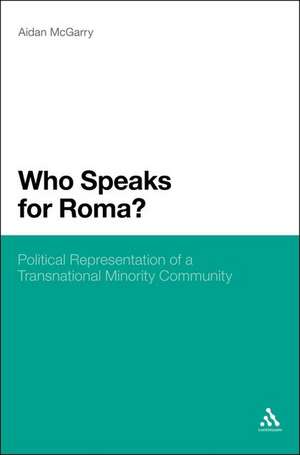Who Speaks for Roma?: Political Representation of a Transnational Minority Community
Autor Aidan McGarryen Limba Engleză Paperback – 25 apr 2012
| Toate formatele și edițiile | Preț | Express |
|---|---|---|
| Paperback (1) | 256.20 lei 6-8 săpt. | |
| Bloomsbury Publishing – 25 apr 2012 | 256.20 lei 6-8 săpt. | |
| Hardback (1) | 889.55 lei 6-8 săpt. | |
| Bloomsbury Publishing – 30 iun 2010 | 889.55 lei 6-8 săpt. |
Preț: 256.20 lei
Preț vechi: 330.52 lei
-22% Nou
Puncte Express: 384
Preț estimativ în valută:
49.03€ • 53.24$ • 41.18£
49.03€ • 53.24$ • 41.18£
Carte tipărită la comandă
Livrare economică 22 aprilie-06 mai
Preluare comenzi: 021 569.72.76
Specificații
ISBN-13: 9781441141415
ISBN-10: 1441141413
Pagini: 224
Ilustrații: 9
Dimensiuni: 152 x 229 x 12 mm
Greutate: 0.3 kg
Editura: Bloomsbury Publishing
Colecția Continuum
Locul publicării:New York, United States
ISBN-10: 1441141413
Pagini: 224
Ilustrații: 9
Dimensiuni: 152 x 229 x 12 mm
Greutate: 0.3 kg
Editura: Bloomsbury Publishing
Colecția Continuum
Locul publicării:New York, United States
Caracteristici
Contributes to the understanding of the Romani community, using a multidisciplinary approach that draws from the literature on minority rights, citizenship, international relations, and social movements.
Notă biografică
Aidan McGarry is Lecturer in Politics at the School of Applied Social Science, University of Brighton. His research focuses on the political representation of ethnic minorities. He has contributed several articles to top journals, including Nationalities Paper and Journal of Ethnopolitics and Minority Issues in Europe. He also has co-authored several book chapters and reports.
Cuprins
List of Figures and Tables
Acknowledgements
Acronyms
Glossary
Introduction
Chapter 1: Historical Overview of Roma in Europe
Chapter 2: Political Participation and Representation of Roma
Chapter 3: Ambivalent Discourse: Rights-Based Theories on Minorities
Chapter 4: Who Speaks for Roma? Organising Structures of Representation in Romania
Chapter 5: Self-Government and Interest Representation in Hungary: A Wrong Step in the Right Direction?
Chapter 6: Roma Representation in the Transnational Political Context
Chapter 7: Conclusion
References
Index
Acknowledgements
Acronyms
Glossary
Introduction
Chapter 1: Historical Overview of Roma in Europe
Chapter 2: Political Participation and Representation of Roma
Chapter 3: Ambivalent Discourse: Rights-Based Theories on Minorities
Chapter 4: Who Speaks for Roma? Organising Structures of Representation in Romania
Chapter 5: Self-Government and Interest Representation in Hungary: A Wrong Step in the Right Direction?
Chapter 6: Roma Representation in the Transnational Political Context
Chapter 7: Conclusion
References
Index
Recenzii
Aidan McGarry does not claim to speak for Roma, but his book is a thoughtful and well-informed reflection on those who do. The importance of the subject can hardly be overestimated. Many Roma in Europe face tremendous problems of poverty, discrimination and social exclusion. Issues of political mobilization, participation and representation are a key part of that puzzle. The analysis on offer here is a welcome contribution to an emerging body of research that examines activism for the Roma against the background of broader theoretical and political debates about diversity, social equality, and minority rights. --Peter Vermeersch (University of Leuven) is the author of The Romani Movement: Minority Politics and Ethnic Mobilization in Contemporary Central Europe.
... the book is not only a valuable contribution to the growing literature on the political participation of Roma, it is also recommended for all those activists, policy-makers, and- in general- concerned European citizens, who wishes to understand better the difficulties and anomalies of giving voice to the most oppressed minority in Europe.
McGarry's book is a significant contribution to Romani Studies and his analysis of 'legitimacy' questions the efficacy of the political representation of Romani rights as currently conceived in Europe.
... the book is not only a valuable contribution to the growing literature on the political participation of Roma, it is also recommended for all those activists, policy-makers, and- in general- concerned European citizens, who wishes to understand better the difficulties and anomalies of giving voice to the most oppressed minority in Europe.
McGarry's book is a significant contribution to Romani Studies and his analysis of 'legitimacy' questions the efficacy of the political representation of Romani rights as currently conceived in Europe.











